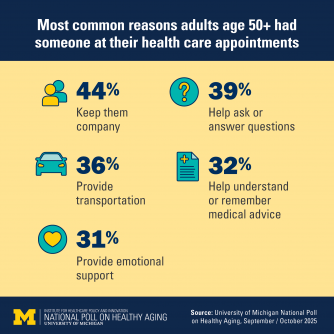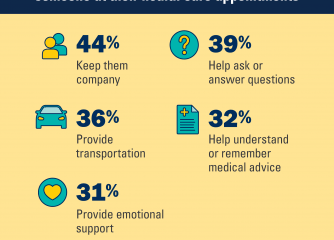Health
Older Adults Benefit from Health Care Companions, New Poll Shows

Recent findings from a national poll reveal that health care companions significantly enhance the experience of older adults during medical appointments. Conducted by the University of Michigan, the survey indicates that 38% of individuals aged 50 and above had another adult accompany them to at least one health care visit in the past year, including 4% who had a companion join a telehealth appointment.
The poll, which is part of the National Poll on Healthy Aging, shows that a substantial majority of older adults found having a companion beneficial. An impressive 92% of those who had someone accompany them reported that the support was helpful. This statistic climbs even higher among those acting as companions, with 99% acknowledging the value of their presence.
Health care companions serve various roles, from asking questions during consultations to helping patients comprehend and act on medical advice. They also assist with transportation, emotional support, and physical mobility needs. Overall, 92% of adults over 50 had at least one health care appointment in the last year, highlighting opportunities for increased support during these visits.
The poll data was collected through a representative survey conducted by NORC at the University of Chicago in February 2025, encompassing 2,883 adults across the United States. The sample was weighted to reflect the broader U.S. population.
Understanding the Benefits of Companionship
According to Jeffrey Kullgren, M.D., M.P.H., M.S., a primary care physician and associate professor of internal medicine at the U-M Medical School, having a companion can significantly improve the quality of care patients receive. Kullgren, who practices at the VA Ann Arbor Healthcare System, emphasized, “If they want to have another person who can support them in the room or as part of a telehealth visit, I welcome it.”
Despite these positive findings, the poll reveals that 62% of older adults chose not to bring someone with them to appointments in the past year. Reasons cited include a belief that they did not need assistance (80%) and a preference to attend alone (20%). Notably, 11% expressed concern about being a burden, while 6% reported having no one available to accompany them.
Kullgren suggests that health care providers should actively encourage patients to bring companions to both in-person and telehealth appointments. He advocates for optimizing care environments and digital tools to facilitate the involvement of companions in patient care.
Companions Enhance Patient Engagement
The survey highlights that those accompanied by a health care companion were more comfortable sharing information about their health. Specifically, 83% stated that having a companion made them feel at ease when discussing their health information, while 79% felt it aided them in following the instructions provided by their health care professional. Moreover, 76% reported that their companion positively impacted the quality of care received.
Among those who acted as companions, a remarkable 92% felt their support helped the patient follow through with medical recommendations, and 89% agreed that their presence improved the quality of care delivered.
The results indicate a largely untapped resource for enhancing patient interactions within the health care system, especially for those with complex health needs.
The most common companions identified in the poll were spouses or partners, who were present for 71% of appointments where a companion was involved. Adult children accompanied 20% of older adults, while 28% of those who attended another person’s appointment were there with their parent. Other relatives and friends also participated as companions.
Gender differences were observed in the data. Only 35% of women over 50 had someone accompany them to an appointment compared to 42% of men. Conversely, women were more likely than men to serve as health care companions, with 38% of women reporting they had assisted another older adult, compared to 30% of men.
Individuals over 50 who reported fair or poor physical health, as well as those with disabilities that limit daily activities, were more likely to have a companion at their appointments. Additionally, those aged 65 and older were more inclined to have a health care companion compared to their younger counterparts aged 50 to 64.
These findings underscore the importance of health care companions in fostering better health outcomes for older adults, emphasizing the need for greater awareness among both patients and health care providers regarding the potential benefits of companionship during medical visits.
-

 Technology4 months ago
Technology4 months agoDiscover the Top 10 Calorie Counting Apps of 2025
-

 Health2 months ago
Health2 months agoBella Hadid Shares Health Update After Treatment for Lyme Disease
-

 Health3 months ago
Health3 months agoErin Bates Shares Recovery Update Following Sepsis Complications
-

 Technology4 weeks ago
Technology4 weeks agoDiscover 2025’s Top GPUs for Exceptional 4K Gaming Performance
-

 Technology2 months ago
Technology2 months agoElectric Moto Influencer Surronster Arrested in Tijuana
-

 Technology4 months ago
Technology4 months agoDiscover How to Reverse Image Search Using ChatGPT Effortlessly
-

 Technology4 months ago
Technology4 months agoMeta Initiates $60B AI Data Center Expansion, Starting in Ohio
-

 Technology4 months ago
Technology4 months agoRecovering a Suspended TikTok Account: A Step-by-Step Guide
-

 Health4 months ago
Health4 months agoTested: Rab Firewall Mountain Jacket Survives Harsh Conditions
-

 Lifestyle4 months ago
Lifestyle4 months agoBelton Family Reunites After Daughter Survives Hill Country Floods
-

 Technology3 months ago
Technology3 months agoUncovering the Top Five Most Challenging Motorcycles to Ride
-

 Technology4 months ago
Technology4 months agoHarmonic Launches AI Chatbot App to Transform Mathematical Reasoning


















